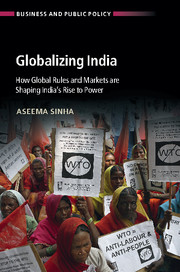Book contents
- Frontmatter
- Dedication
- Contents
- List of figures
- List of tables
- Preface and acknowledgments
- Note on currency translation
- List of abbreviations
- 1 How global rules and markets are shaping India's rise to power
- 2 A theory of causal mechanisms and Global Design-in-Motion
- 3 Trade, statecraft, and state capacity in India
- 4 Realigning interests toward global reach: Changes in India's pharmaceutical sector
- 5 Mobilizing new interests and tying the state's hands: Decline and revival in the textile sector
- 6 Interests in motion: Private sector change in India's textile sector
- 7 Mechanisms of change within global markets
- 8 Conclusion
- Appendix: Field trips, and list of interviews, and libraries visited
- References
- Index
3 - Trade, statecraft, and state capacity in India
Published online by Cambridge University Press: 05 April 2016
- Frontmatter
- Dedication
- Contents
- List of figures
- List of tables
- Preface and acknowledgments
- Note on currency translation
- List of abbreviations
- 1 How global rules and markets are shaping India's rise to power
- 2 A theory of causal mechanisms and Global Design-in-Motion
- 3 Trade, statecraft, and state capacity in India
- 4 Realigning interests toward global reach: Changes in India's pharmaceutical sector
- 5 Mobilizing new interests and tying the state's hands: Decline and revival in the textile sector
- 6 Interests in motion: Private sector change in India's textile sector
- 7 Mechanisms of change within global markets
- 8 Conclusion
- Appendix: Field trips, and list of interviews, and libraries visited
- References
- Index
Summary
On July 25, 2014, the Indian government, on behalf of a group of thirty-three countries, conveyed to the WTO General Council that “the adoption of the TF [trade facilitation] protocol must be postponed till a permanent solution on public stockholding for food security is found.” Strangely enough, after years of research and careful preparation, the Indian trade ministry was ready to implement the TF agreement, and India's stance did not represent opposition to the TF agreement per se. While Indian trade negotiators had resisted agreements before, this was a rare strategy of linking two different parts of the WTO agreement, one related to trade facilitation and the other related to the Agreement on Agriculture, when the collapse of the December 2013 Bali Agreement on Trade Facilitation would have been a serious blow to the Doha Round. India's strategic stance was immediately successful. In November 2014, India and the United States arrived at a bilateral agreement that would restore the “peace clause” agreed on in Bali and ensure that India and other developing countries would not be challenged under the WTO's dispute procedure for “stockpiling” 10 percent of their food supplies as long as they were transparent about the food security schemes. What explains the contrast between India's failure in the Uruguay Round (1988–1994) and India's new capability for complex negotiations? We cannot understand this episode without exploring the processes of state transformation and institutional development unleashed by globalization within India.
If war makes states, then trade re-forms states. A more confident state may seek global participation as well as domestic trade reform, using its external trade commitments to nudge changes in domestic trade politics. How could this process unfold? I argue that a country's participation in a rule-bound global trading system reforms states, changes the direction of their trade policy, and shapes domestic institutional development (Rodrik 2002). Why does this happen? The rule-bound global system creates higher transaction costs and onerous limits on sovereignty. This demands new kinds of expertise, institutional reform, and policy responses. An embedded global trade regime not only necessitates new state capacities but also demands new political strategies of statecraft – tradecraft – to manage trade negotiations and defend them internally. Both functional and political capacities are developed and unleashed through this interaction. This may reorder relationships between state and society in a country, creating the need for varied public–private consultations and partnerships.
- Type
- Chapter
- Information
- Globalizing IndiaHow Global Rules and Markets are Shaping India's Rise to Power, pp. 62 - 107Publisher: Cambridge University PressPrint publication year: 2016

